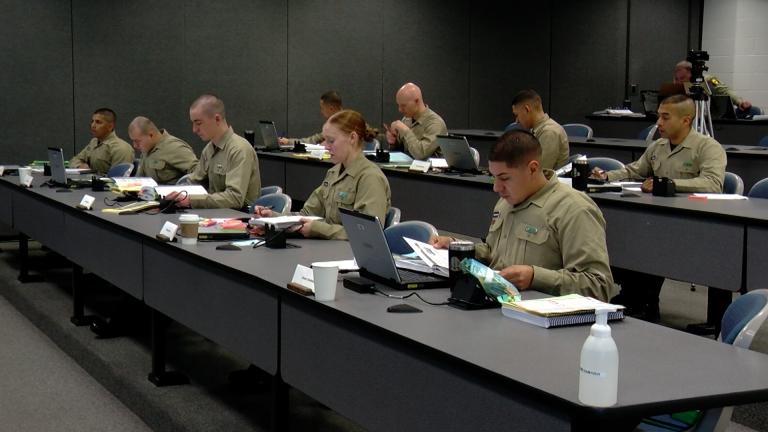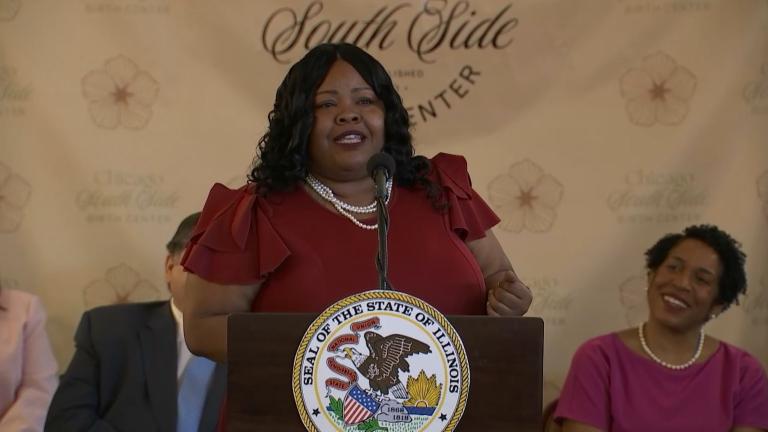Women in Chicago’s radio industry are speaking out about the sexism they’ve faced.
Longtime morning show host Eric Ferguson left WTMX’s The Mix last month as he and the station’s parent company Hubbard Radio Chicago face lawsuits from female colleagues, alleging a toxic environment for women, including coerced sexual acts, and management’s inadequate handling of complaints.
This comes as the Chicago Tribune published a scathing 10-month investigation into what women face in the male-dominated industry. The reporters spoke with dozens of women in radio about their experiences.
“Being the only one puts a target on your back.”
Julie DiCaro is a writer and editor for Deadspin. She used to be a radio host at WSCR’s 670 The Score. She’s also the author of “Sidelined: Sports, Culture, and Being A Woman in America.”
DiCaro said she has always been the only woman in the room in sports talk radio.
“That’s difficult. It’s always been important to me that the shows I do try to reflect the fan base, the community and the listening audience. That’s never really been the case for sports radio. They’re very just focused on the male 18 to 54 age group or whatever it is and, the rest of the audience doesn’t matter. I think that that’s very much reflected in the lineups,” DiCaro said.
She said being the only woman on air put a target on her back — and does so for other marginalized identities too — especially as she weighed in on stories about players harassing or assaulting someone.
DiCaro says she faced significant harassment online and through the text line. She said sports radio companies need to do more to protect women and other marginalized identities.
“They want you there to talk about topics, but they don’t protect you. The way to protect yourself is self-censorship,” DiCaro said. “You learn that on certain days, you just don’t have bandwidth for it, so you stay quiet about it. I think that act of self-preservation limits the debate out there, limits the voices we need.”
“You have to tolerate a fair amount of joshing and crude jokes”
Mary Dixon is the Morning Edition anchor at WBEZ. Previously, she was at WXRT for 28 years until she was laid off in 2019.
“Being a woman in radio is most likely like being a woman in any other male-dominated industry in that you are often the only woman in the room. You are constantly being assessed and policed for superficial things like your appearance and your voice … You have to tolerate a fair amount of joshing and crude jokes, and you go along with a lot of it because you just need to get on with it and do your job.”
Early in her career, Dixon says a manager said her voice needed to sound more “authoritative,” which she took to mean it needed to be lower.
“My voice is fine. It didn’t need to be pitched lower. It’s authoritative on its own, but the expectation that the voice of authority is that of a white male is kind of what I came up with,” Dixon said.
Dixon told her male colleagues that they have a lot more power in these situations than she does.
“If you speak up and say, ‘This can’t happen,’ the guy who is creating a problem might listen to you. They might not, but they might listen to you because you’re a dude. “
She had conversations like this with her male colleagues several times, but they never did, Dixon said.
“A housecleaning needs to happen.”
Jennifer Ashrafi, was a traffic reporter and co-host of The Mix’s afternoon show. She was known on air as Jennifer Roberts. She left the industry in January 2020.
“It was very difficult [to leave], and quite honestly I probably stayed a few months longer than I should have for my own mental health just because I was like, ‘If I do this, it’s permanent … if you walk away from this, it’s forever.”
Ashrafi said she was physically and mentally not well because of the environment she was working in. She said she was underpaid, and that the station was “stripping my role away from the show.”
When she left, Ashrafi says she told a male executive that all three of Hubbard Radio Chicago’s stations had a “problem with women.”
“What I meant by that was … that there were all sorts of problems from sexual harassment — I did not know about sexual assault — but sexual harassment, gender discrimination, just women being treated poorly in general was everywhere and I felt it was my duty on my way out to try to save those people,” Ashrafi said.
One of the lawsuits against Hubbard, filed by former host Melissa McGurren, includes a statement from Ashrafi saying she told executives about this.
“If my experience at my specific station and ownership of that station is indicative of the others, a house cleaning needs to happen,” Ashrafi said, noting there needs to be a real effort to change the culture.
Since the Tribune’s article, Ashrafi said many women have reached out to her with similar experiences to hers.
“What I have said is, ‘Now is the time, the momentum is on our side. It’s on your side to speak your truth without fear,’” Ashrafi said. “That’s easier said than done … I’ve said that many times. I don’t think anyone has actually taken me up on that advice because it’s very scary, and I was that person. I was the person who wouldn’t speak up because I was scared. So, I get it.”
The Mix’s parent company, Hubbard Radio Chicago, did not respond to WTTW News’ request for comment.








